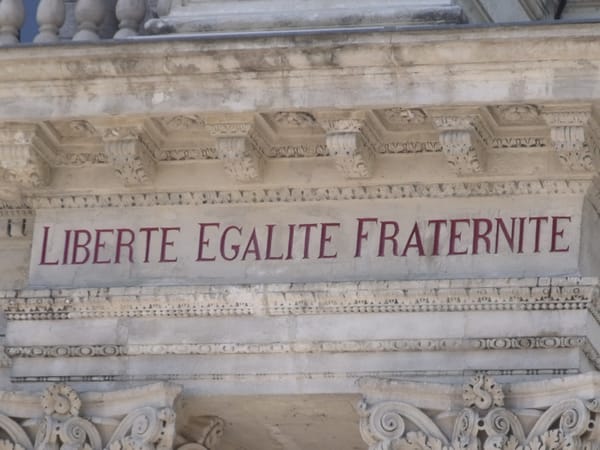1795 and 1934: Condorcet on Monopoly, Tyranny and Economic Justice

Marie-Jean-Antoine-Nicolas de Caritat (better known as the Marquis de Condorcet) was a pioneer in probability theory, a revolutionary, a constitutionalist, and a martyr for the Enlightenment. His life story and tragic death have been the subject of many philosophical and biographical histories. One biography in particular, J. Salwyn Schapiro’s 1934 Condorcet and the Rise of Liberalism, is a unique vantage point on Condorcet’s many intellectual contributions, written in the wake of the Great Depression, as fascism strengthened its foothold in Europe. Rise of Liberalism combines biographical detail, historical context, and a concise summary of Condorcet’s views on political, intellectual, economic and religious liberalism, as well as feminism, education and progress. In critical passages the book reveals more about the industrial anxieties of the 1930s than it does about Condorcet’s views on economics and politics. Nevertheless, I argue that Condorcet’s observations on monopoly, tyranny and economic justice are as relevant today as they were in 1795 or 1934.
A Depression-era (mis)interpretation of Condorcet
Writing in 1934, Schapiro recognized the crisis of the era, “Liberalism is now being challenged..[it] has been…totally and violently repudiated…in communist Russia and in fascist Italy and Germany.” One might expect that Condorcet’s work, at the foundation of liberalism, would have some wisdom to offer? Schapiro, it seems, could not find it. The severity of the Great Depression had thoroughly discredited, in the mind of Schapiro and many of his contemporaries, the entire machinery of modern economics and politics. Industrialization and liberal democracy had failed to anticipate, forestall, or—yet—meaningfully mitigate the economic consequences of the Depression. Condorcet’s faith in democractic decision-making and economic liberty appeared, to Schapiro anyway, to be naïve and anachronistic, offering a solution to a distinct and long-departed set of economic and political problems.
In this context, Schapiro concluded that radical changes to economic and political institutions were necessary. He argued that the very success of industrialization had made “the industrial system continually more unstable.”1 Instead, the economic security of the working class would require “state regulation of business enterprise through economic planning” accelerated by “giving more authority to the executive, who would wield power, not as an irresponsible dictator, but as a democratically chosen official.” In short, Schapiro concluded, the “consolidation in industry must find a political counterpart in concentration of power.”
This conclusion is jarring—stunning even—for at least two distinct but important reasons. First, it is particularly striking because, arriving at the end of a biography of Condorcet, it is so antithetical to Condorcet’s most strongly held beliefs and most persuasive arguments. Condorcet wrote at length about the threats to liberty from both monopoly and tyranny, concentrated power in the economic and political spheres, and how the two worked together to maintain corrupt and unaccountable government. Second, Schapiro’s advocacy for a more powerful executive is especially unsettling in historical context. To put it bluntly, how can one watch Adolf Hitler and Benito Mussolini systematically and ruthlessly destroy democratic institutions and conclude, “What we need here is more executive power”? To arrive at this conclusion so readily suggests that the idea of handing over public authority to a single, unconstrained actor is always at the threshold of mainstream discourse.
Monopoly and corruption
Condorcet’s most famous work, written in hiding and published posthumously in 1795, promised to do nothing less than outline the history and future of humanity, including its predominant obstacles and hopeful prospects. The corrupt relations between governments and their favored industries featured prominently throughout. Historically, “[g]overnments interested themselves in commerce only in order to enfeeble it by taxation, restrict it through privileges, or dispute its monopoly amongst themselves.”2 These monopolies had also been vicious tools of colonial oppression, “[s]urvey the history of our settlements…you will see how our trade monopolies, our treachery, our murderous contempt for men of another colour or creed…have destroyed the respect and goodwill” Europe might have earned with more liberal relations.
With Condorcet’s characteristic optimism about future progress, he predicted that “the nations of Europe will finally learn that monopolistic companies are nothing more than a tax imposed upon them in order to provide their governments with a new instrument of tyranny.” Widespread opportunity did not come from state favoritism, it would only result “if free trade and industry were allowed to remove the advantages that accrued wealth derives from any restrictive law or fiscal privilege.”
Laws over leaders
Condorcet was also a fervent believer in legislative supremacy and vigorous critic of the separation of powers, which led him to prefer a weak executive over a strong one to counterbalance the legislature. Rather than encourage prudence and consensus, checks-and-balances would lead to the obfuscation and corruption in public decisions. “Experience everywhere has proved that these complicated machines have destroyed themselves” or managed to function only through “intrigue, corruption and indifference.” The security of the people would instead be preserved by a declaration of rights, a single, popularly-elected legislature, and an executive council with limited authority and no role in legislative affairs. In Condorcet’s 1793 plan for a new French constitution, neither the executive council nor the nation would have a clear and authoritative leader. The designation or selection of a supreme executive “will always retain some vestige of royalty” and, as a consequence, “[t]he predominant impression will be, not of the law in all its purity, but of the man in charge.”
Condorcet’s views on monopoly and executive power were not unrelated. Monopoly was facilitated above all by legal protection from competitors, both foreign and domestic. Critically, it was easier to erect and maintain those protections with an alliance of king and corporation. A representative legislature, in contrast, was more likely to be reflective of broad public interest, and less susceptible to corrupting influence. Condorcet’s answer to concentrated economic power was not concentrated and arbitrarily exercised executive power, but precise executive authority, delineated in law, preventing incumbent economic powers from exploiting the executive to erect barriers to potential competitors.
Suffering and social insurance
Condorcet’s seemingly dogmatic free-market views could easily be mistaken for laissez-faire, and while he was deeply skeptical of state favoritism of particular industries, corporations, or guilds, he was even more passionately motivated to attack poverty and inequality through public action. Much of the suffering associated with inequality was driven by the unpredictable income and limited wealth of poor laborers. Condorcet argued that the connection between limited wealth and economic risk “can in great part be eradicated by guaranteeing people in old age a means of livelihood…by securing for widows and orphans an income…by providing children with the capital necessary for the full use of their labor.” Condorcet was also an early and detailed advocate for universal public education, to promote both enlightenment and economic gains for the newly educated. “With greater equality in education there will be greater equality in industry and so in wealth.”
Importantly, social spending was not merely redistributive, it would provide invaluable insurance “making it possible to prevent those periodic disasters which strike at so many families and which are such a recurrent source of misery and suffering.” Condorcet’s friend and collaborator Thomas Paine made clear, not long after Condorcet’s death, that this form of social insurance was not some kind of charity from the landed aristocracy, but a natural right, financed by a tax on land, “the common property of the human race.”
Recognizing the economic challenge
What Schapiro saw as an unprecedented economic challenge—the plight of the industrial working class—caused by a unique economic circumstance—the industrial conglomerate—was simply a contemporary manifestation of a frustratingly persistent feature of the economy. The economic precarity of the serf or the urban laborer and the economic power of the guild or the monopolistic corporation were the stark reality of Condorcet’s France. Where Schapiro saw new circumstances that demanded new solutions, a more careful reading of Condorcet reveals economic problems that have been observed and analyzed for centuries.
It is clear that we continue to debate which mix of political institutions and economic policies will best serve the public interest in light of these challenges. Progress in this debate would be best served by avoiding simplistic visions of laissez-faire as well as approaches that put faith in “enlightened” but unconstrained actors. Across history it is evident that times of economic insecurity generate support for more protection of industry facilitated by concentrated power. Condorcet offered a compelling alternative with rich moral and conceptual foundations. The provision of social insurance and education would reduce poverty and promote opportunity for the working class, while the abolition of state-sanctioned monopolies would keep the prices of essential goods low and open up previously protected occupations. Equally important, these policies would have a clear legislative basis rather than rely on capricious executive power.
There remains a tendency to see contemporary economic challenges as unique or unprecedented. This persuasive illusion is behind the temptation to break essential liberal democratic norms, imagining that these unprecedented circumstances require desperate action. In reality, economic insecurity and the struggle to promote public interests over narrow economic interests are all too familiar. This insight is both discouraging and useful. Discouraging that economic security remains aspirational for so many, but useful to recognize that modern economies are facing obstacles that are less unique and better understood than might be apparent at first glance. A clear understanding of these obstacles should underpin an effective public response. Condorcet’s work anticipated key elements of such a response.
Condorcet’s deep-rooted insights notwithstanding, one should not overstate the ease of addressing these unyielding economic problems. Even with generous social insurance and accessible, universal education, achieving durable economic gains for the working class in the face of a dynamic economy is extraordinarily challenging. Limiting monopoly power while maximizing economic freedom is a similarly vexing paradox. Nevertheless, while modern antitrust policy is highly complex, it is orders of magnitude simpler, and less intrusive, than anything resembling nationwide “economic planning.” Appropriate public responses can be shaped more effectively when the underlying economic challenges are seen more clearly—not unprecedented, but rather frustratingly persistent.
1 While beyond the scope of this essay, it is worth noting that this explanation of the economic instability associated with the Great Depression is incorrect. Its primary cause was blind adherence to certain aspects of the monetary Gold Standard, which discouraged central banks, including the Federal Reserve, from adequately responding to the signs of economic stress preceding and during the Great Depression. See, for example, Barry Eichengreen on the Gold Standard and Great Depression.
2 All excerpts from Condorcet’s Sketch are from the Cambridge edition of Condorcet’s Political Writings.
Featured Image is Condorcet commits the act of suicide in prison to avoid his sentence




